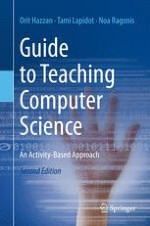2014 | OriginalPaper | Buchkapitel
12. Integrated View at the MTCS Course Organization: The Case of Recursion
verfasst von : Orit Hazzan, Tami Lapidot, Noa Ragonis
Erschienen in: Guide to Teaching Computer Science
Verlag: Springer London
Aktivieren Sie unsere intelligente Suche, um passende Fachinhalte oder Patente zu finden.
Wählen Sie Textabschnitte aus um mit Künstlicher Intelligenz passenden Patente zu finden. powered by
Markieren Sie Textabschnitte, um KI-gestützt weitere passende Inhalte zu finden. powered by
